The Legend of the City of Jinn
Reading time: 7 min
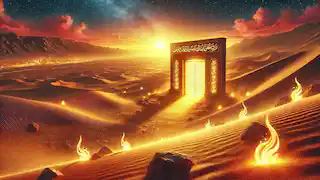
About this story: The Legend of the City of Jinn is a Legend from Iran set in the Ancient This Dramatic tale explores themes of Courage and is suitable for Adults. It offers Moral insights. An ancient city guarded by fiery spirits tests the courage and wisdom of those who dare to seek its secrets
Beneath the ancient skies of Persia, where the stars glimmer like jewels and the desert stretches endlessly, lies a legend older than memory itself. Hidden within the vast sands of the Dasht-e Kavir, an ancient city whispered about in tales and forgotten scrolls remains shrouded in mystery. Known as the "Shahr-e Jinn"—the City of Jinn—it is said to be a place where the mortal and the mystical converge. For centuries, storytellers have painted it as a city of untold beauty, guarded by fiery spirits born of smokeless fire. Some call it a paradise of knowledge, while others insist it is a trap for the greedy and unworthy.
This is the story of Aryan Arashpour and his fateful expedition to the City of Jinn, a journey that forever altered the lives of those who undertook it—and left an indelible mark on the sands of history.
The Whisper of Forgotten Lore
Aryan Arashpour had always been drawn to the past. As a child, he spent hours flipping through books in his grandfather's library, imagining himself as an explorer uncovering lost civilizations. Now, as a professional archaeologist in Tehran, he spent his days in the dimly lit corridors of the National Library, pouring over manuscripts older than the language they were written in.
One evening, as the library's clock chimed softly in the background, Aryan’s hand brushed against a book that seemed oddly out of place. The spine was cracked, the leather worn, and the title barely legible: “Mysteries of the Invisible Realms.” Intrigued, he opened it, his fingers brushing against fragile pages that threatened to crumble. Within, he found an entry about the City of Jinn.
The text spoke of a city hidden deep in the Dasht-e Kavir desert, a place that served as a nexus between the mortal world and the realm of the Jinn. It described the city as a living enigma, filled with treasures beyond comprehension but protected by the cunning and wrathful spirits. It warned that those who sought the city without humility or wisdom would never return.
Aryan was captivated. Despite the warnings, the manuscript also hinted at knowledge lost to time—secrets that could benefit humanity. That night, as the city of Tehran bustled outside his window, Aryan resolved to embark on a journey that would define his life.
Assembling the Team
The first step was finding a team. Aryan knew the desert was no place for amateurs, and survival would depend on the skills and expertise of his companions.
He approached Leila Vaziri, a brilliant linguist specializing in ancient Persian and Arabic. A professor at Tehran University, Leila was known for her ability to decipher even the most cryptic scripts. When Aryan presented the manuscript, her curiosity was piqued.
Next was Farhad Mehran, a seasoned desert guide who had spent decades navigating Iran’s harshest terrains. Farhad was a gruff but reliable man who had once led expeditions to the ancient ruins of Persepolis and knew the Dasht-e Kavir like the back of his hand.
Lastly, Aryan sought out Sahar Daryabi, a documentarian with a reputation for capturing the untamed beauty of nature. Sahar’s camera had taken her to the peaks of Mount Damavand and the depths of Lut Desert. She agreed eagerly, seeing the expedition as the adventure of a lifetime.
Together, they gathered their equipment—tents, provisions, maps, and a small caravan of camels. On the morning of their departure, the sun rose over the Alborz Mountains, casting a golden light on their journey into the unknown.
The Desert Beckons
The Dasht-e Kavir was as harsh as it was beautiful. By day, the sun scorched the earth, its heat rippling like waves across the dunes. By night, the desert transformed into a realm of biting cold, with stars spread across the sky like scattered diamonds.
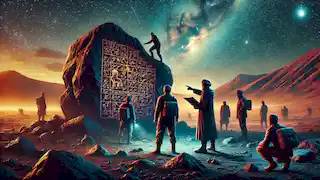
Farhad led the group with practiced ease, his camel moving steadily through the shifting sands. Aryan studied the manuscript for clues, while Leila and Sahar marveled at the desert’s stark beauty. Despite their enthusiasm, an undercurrent of unease hung in the air. The silence of the desert was too perfect, too absolute.
On the fourth day, the first sign of the city appeared: a weathered outcrop of black stone protruding from the sand. Etched into its surface were strange symbols, unlike any script Leila had seen. After hours of careful study, she deciphered a fragment: “The gate lies where fire and wind embrace.”
The Gate of Shadows
Their journey led them to a massive obsidian structure half-buried in the sand. The gate stood as a monolithic testament to an ancient civilization. Intricate carvings depicted swirling flames and twisting winds, their artistry almost hypnotic.
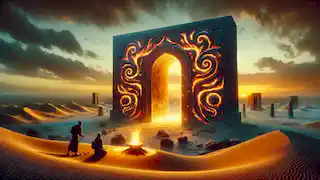
The group inspected the gate for hours. Leila’s analysis revealed a riddle inscribed on its surface, describing the harmony of fire and wind. Aryan, ever the problem solver, recalled ancient Zoroastrian texts that spoke of fire as sacred and wind as its eternal dance partner. They built a small brazier and carefully lit it, positioning it to catch the desert wind. As the flames danced higher, the carvings on the gate began to glow.
With a deep rumble, the gate creaked open, revealing a narrow, twisting pathway. The group hesitated, their excitement tempered by the realization that they were stepping into a realm beyond human comprehension.
The City Beyond the Veil
As they emerged from the pathway, the City of Jinn unveiled itself like a dream. Towers twisted and spiraled, defying the laws of physics, while the streets shimmered as if woven from moonlight. Pools of water reflected an alien sky, filled with constellations they didn’t recognize.
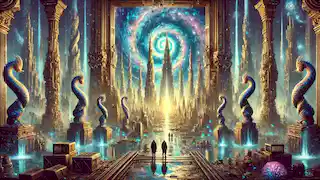
The city was eerily silent. They encountered no signs of life, yet they felt an unshakable sense of being watched. Sahar’s camera began malfunctioning, capturing images with strange distortions—blurry figures, glowing orbs, and streaks of fire.
In one grand hall, they found treasures that defied belief. Jewels that pulsed with an inner light, scrolls inscribed with languages no one could read, and artifacts that seemed to hum with energy. Farhad, tempted by a golden chalice, reached out to touch it. In that instant, the air grew heavy, and shadows began to coalesce.
Confronting the Jinn
The shadows formed towering figures, their bodies wreathed in fire and smoke. Their eyes burned like embers as they stared down at the intruders. A voice echoed through the hall, speaking in ancient Persian: “Who dares disturb the sacred city?”
Aryan stepped forward, trembling but resolute. He explained their quest for knowledge and promised they sought no harm. The Jinn listened, their fiery gazes unyielding. After a long pause, they issued a challenge: “Prove your worth, mortals, or remain here forever.”
The group was to face three trials, each testing a different virtue.
The Trials of the Jinn
The first trial was one of courage. The group was plunged into a maze where walls shifted and illusions preyed on their fears. Aryan nearly lost himself to a vision of his late mother, but Leila’s voice called him back. Together, they navigated the labyrinth, emerging as a united team.
The second trial tested their wisdom. Three riddles were posed, each more cryptic than the last. One involved solving a paradox about existence, while another required decoding an ancient mathematical sequence. Leila’s sharp intellect proved invaluable, and they passed with seconds to spare.
The final trial demanded sacrifice. Each member was asked to give up something of deep personal value. Aryan offered his mother’s locket, Leila her father’s journal, Farhad a compass he had used for decades, and Sahar her camera. The Jinn accepted their offerings, their fiery forms softening slightly.
A Price Paid, A Secret Kept
Having passed the trials, the group was granted a single boon. They chose a scroll that seemed to radiate knowledge. As they stepped back through the gate, the city faded behind them, leaving only silence in its wake.
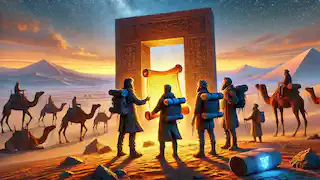
The journey back was arduous, but they carried with them the weight of their experiences. Once home, they studied the scroll, discovering it contained methods for harnessing energy from natural elements—knowledge that could change the course of human history.
Yet, Aryan and his companions agreed to guard the secret, fearing its misuse. The scroll was hidden, and the story of their journey became legend.










